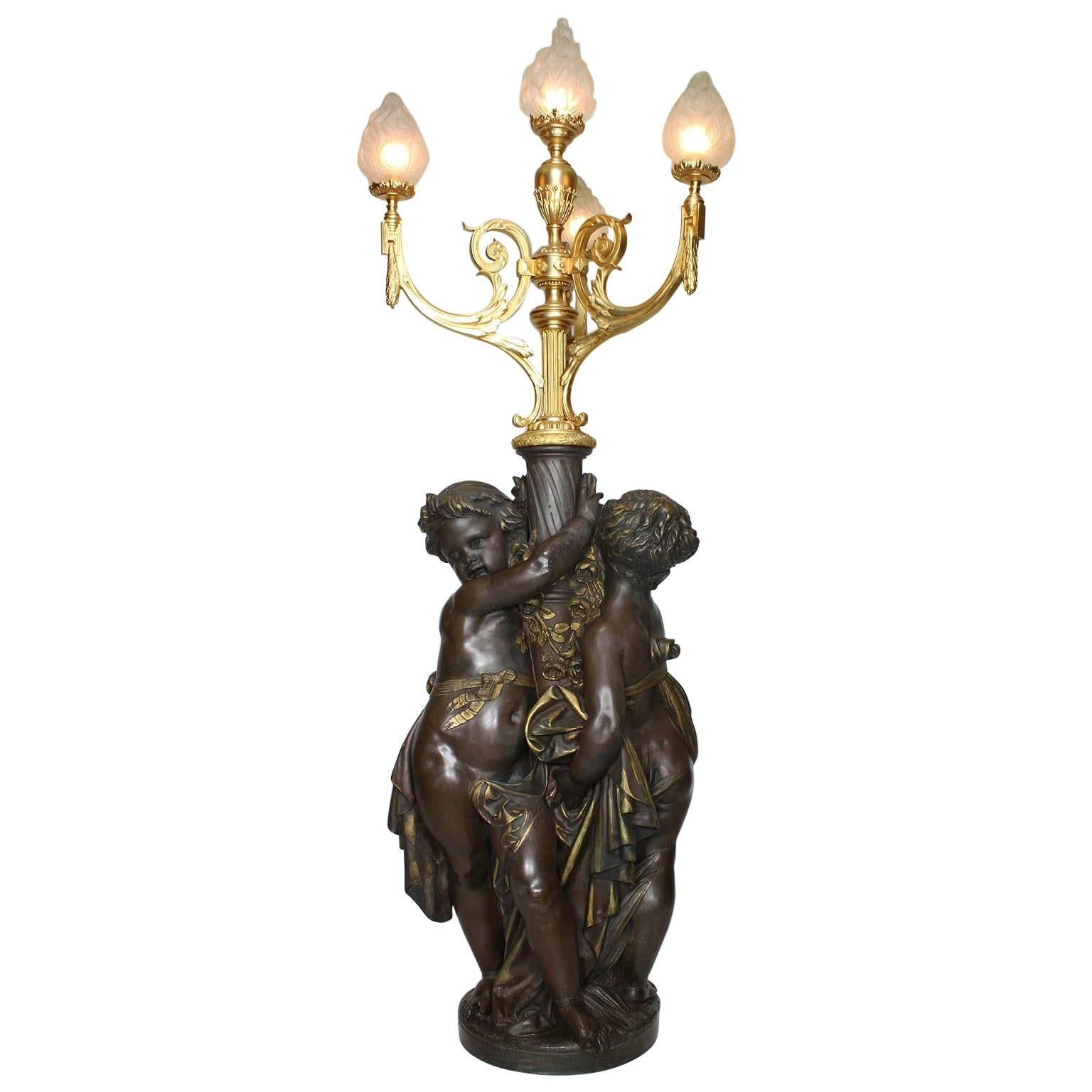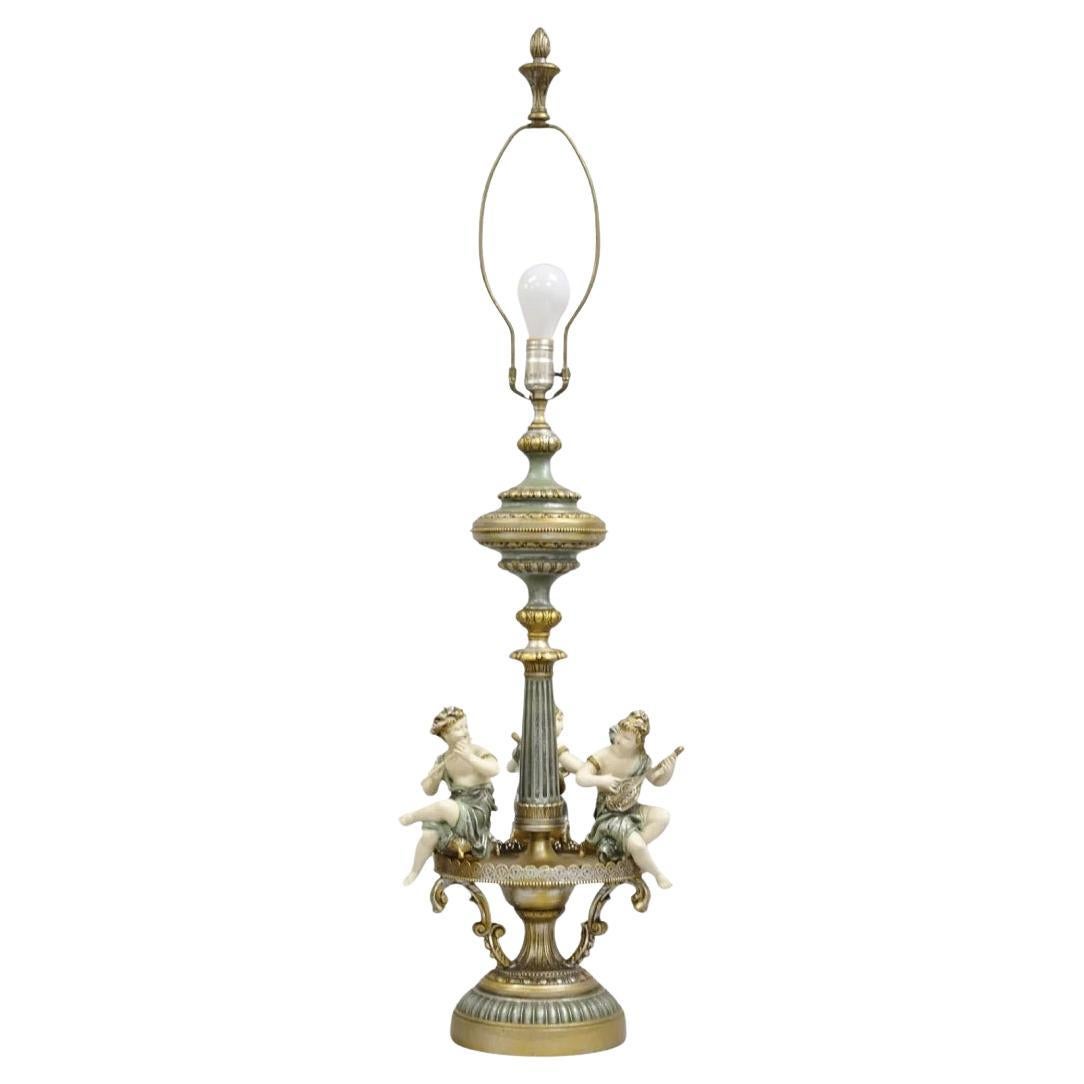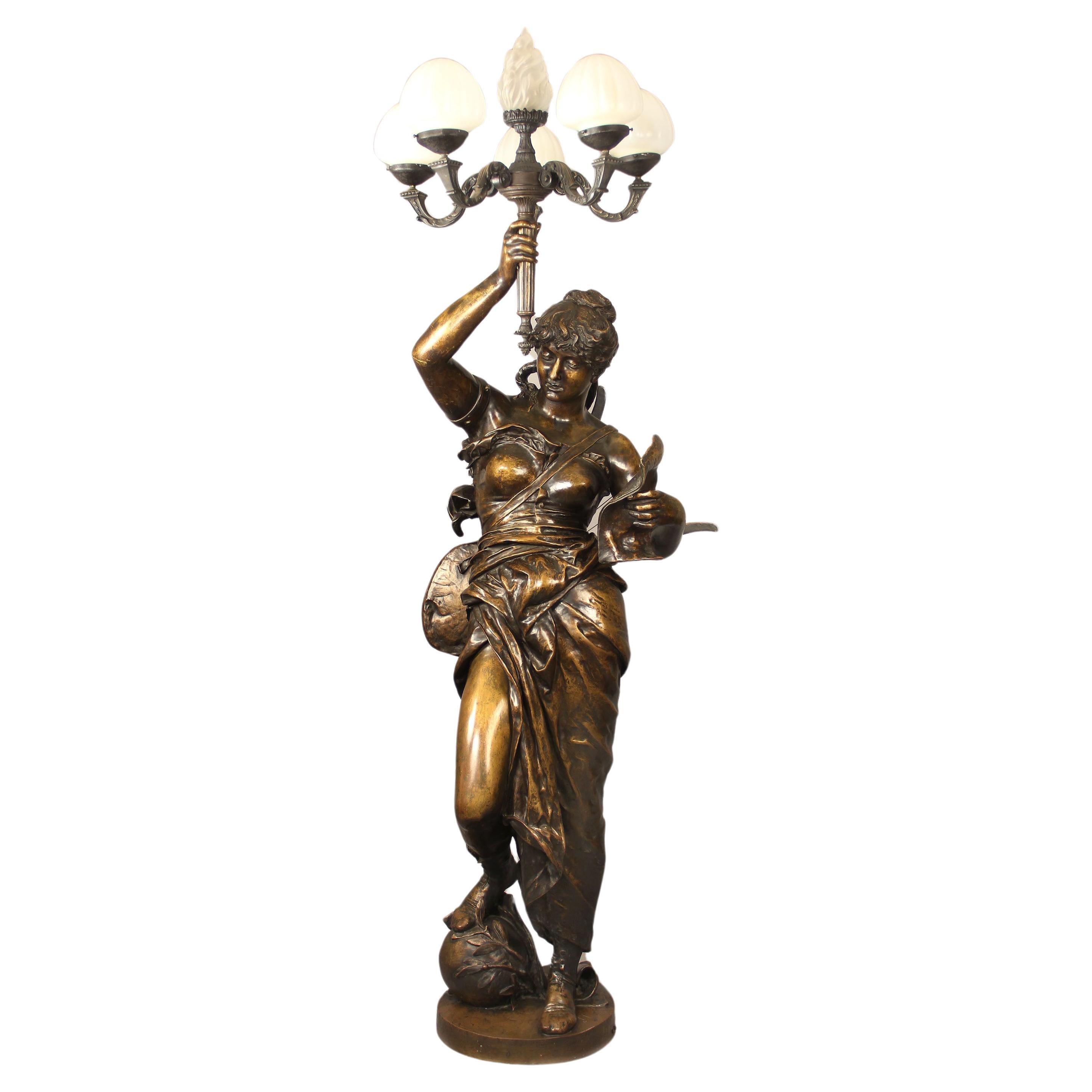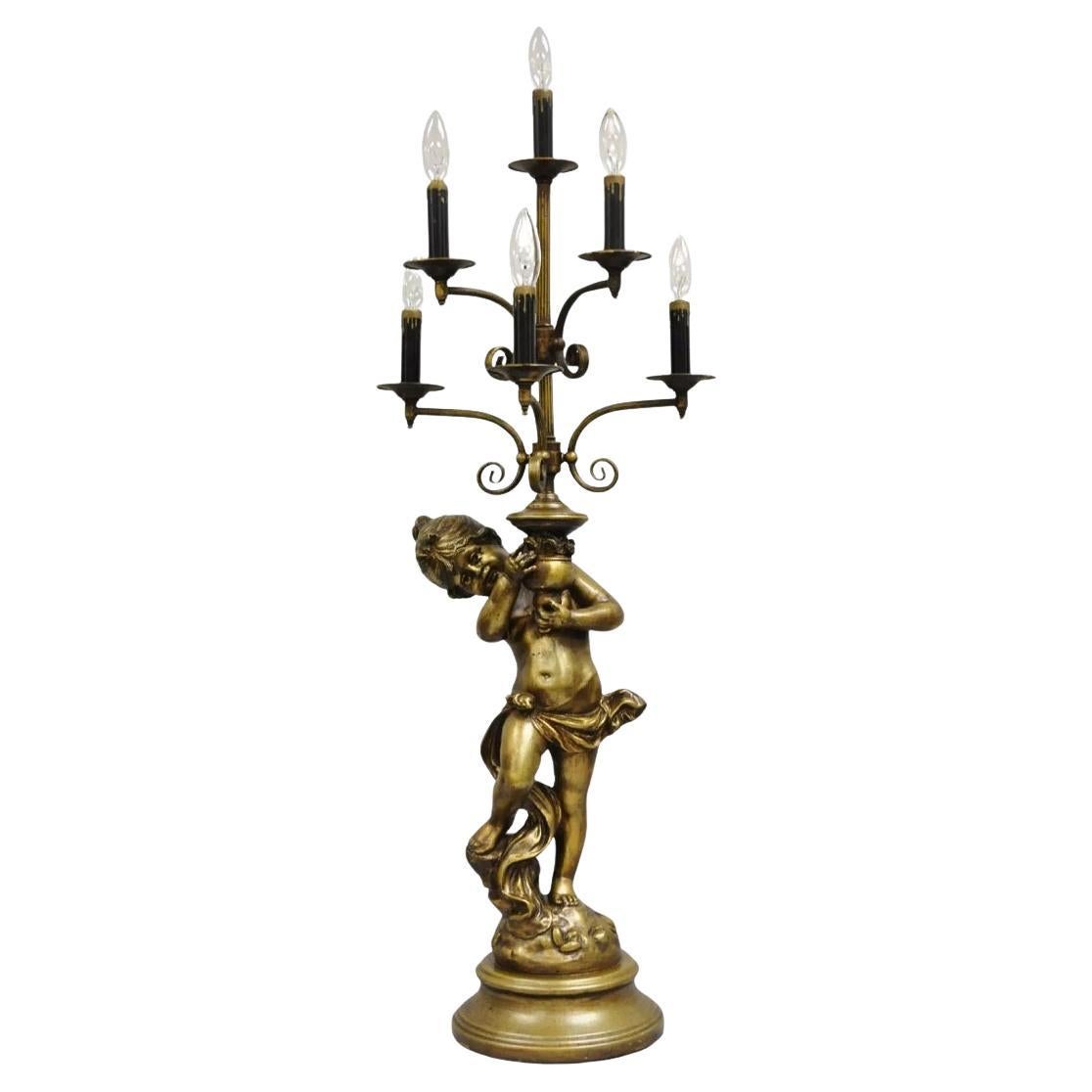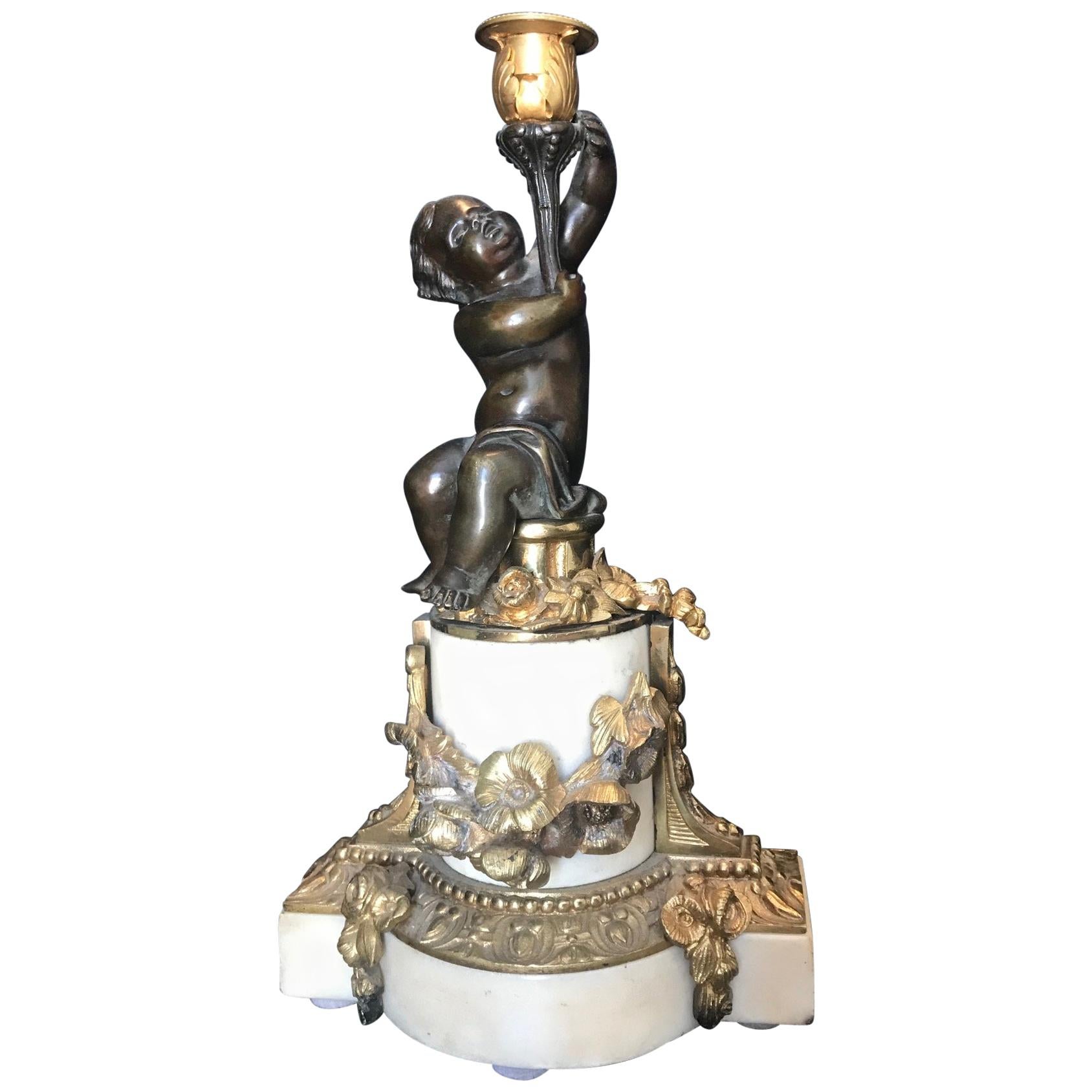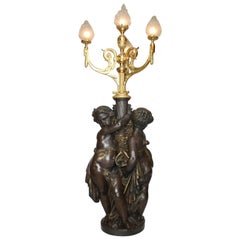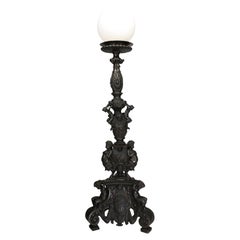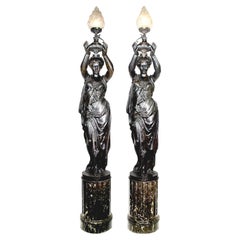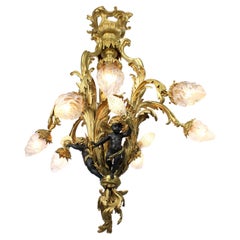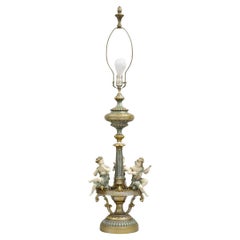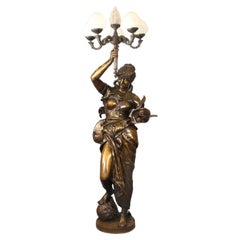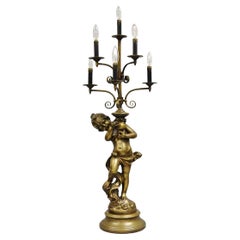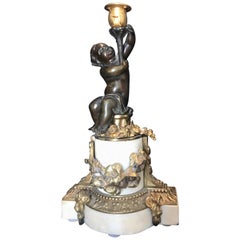Items Similar to Palatial French 19th-20th Century Allegorical Figural Cast Iron Group Torchere
Video Loading
Want more images or videos?
Request additional images or videos from the seller
1 of 10
Palatial French 19th-20th Century Allegorical Figural Cast Iron Group Torchere
$34,850
$85,00059% Off
£26,703.90
£65,131.4759% Off
€30,715.74
€74,916.4359% Off
CA$49,822.85
CA$121,519.1559% Off
A$54,116.65
A$131,991.8259% Off
CHF 28,650.24
CHF 69,878.6459% Off
MX$653,424.95
MX$1,593,719.4059% Off
NOK 357,669.12
NOK 872,363.7059% Off
SEK 338,834.68
SEK 826,426.0559% Off
DKK 229,351.84
DKK 559,394.7359% Off
About the Item
A very fine and palatial French 19th-20th century allegorical figural cast-iron group torchere - sculpture - fountain - representing spring and the harvest, probably cast by Le Fonderies d'Art du Val d'Osne. The charming four-putti sculpture with a front standing putto holding a pole amongst wheat stalks, another putto kneeling and collecting wheat, a third one wearing a hat and picking flowers for a wreath and the fourth kneeling putto holding a bird's nest, all below an elongated classical stem with a glass globe (Electrified), circa: Paris, 1900.
Overall height: 84 inches (213.4 cm).
Width: 29 1/2 inches (74.9 cm).
Circular base diameter: 24 inches (61 inches).
Cast-iron had been in production during the 18th century but its inferior status to the more fashionable and delicate wrought-iron had generally confined its use to architectural work. By the early 19th century, however, rapid developments of the Industrial Revolution combined with the simultaneous burgeoning of a new middle class provided the impetus for a dramatic expansion in its application and in a short space of time a proliferation of iron foundries across Europe and America thrived on the production of everything from inkstands to railway stations. The use of cast-iron for garden ornament became particularly widespread at this time, as the possibilities for its mass-production at a fraction of the cost of bronze made it the material of choice for outdoor statuary, figural lighting, fountains and vases. Nowhere was the popularity and use of cast-iron ornament greater than in France, where by the second half of the 19th century two foundries in particular, which feature prominently in the following collection, had come to dominate production both for the home market and for export. The more important of these was the officially named Société Anonyme des Hauts-Fourneaux et Fonderies du Val-D'Osne, Anciennes maisons J. P. V. André et J. J. Ducel et Fils. Commonly known after 1870 as simply Val D'Osne, the company was originally founded in 1835 and developed rapidly, absorbing smaller foundries in the Haute-Marne area east of Paris. Smaller than Val D'Osne but nevertheless a major player in the manufacture of cast-iron was the firm of A. A. Durenne, established in 1847 at Sommevoire. Both Val D'Osne and Durenne were frequently awarded medals for their work at the many international exhibitions of the latter half of the 19th century. Each also published large catalogues illustrating and listing its entire inventory of models, from which casts of varying size and finish could be ordered.
Fonderies d'Art du Val d'Osne.
Established in 1835 by J.P.V. André, the Fonderies d'Art du Val d'Osne was known for their high quality and extensive collection of cast-iron architectural designed sculptures created exclusively for Victor André by some of the most reputed and established Parisian sculptors like Carrier-Belleuse, Mathurin Moreau, Delaplanche and Pradier. The prolific firm Fonderies d'Art du Val d'Osne participated in numerous international exhibitions and was acclaimed at the 1857 London Exhibition with a monumental bronze fountain cast with swans and Classical figures. The firm was acquired by Barbezat & Cie. in 1867, and allying with the fondeur J.J. Ducel towards 1870, and was renamed Société Anonyme des Hauts-Fourneaux & Fonderies du Val-D'Osne, Anciennes maison J.P.V. André et J.J. Ducel et Fils. The most celebrated work or art cast by the firm would be irrefutably the Parisian subway entrances designed by Hector Guimard. The firm was also known for their comissions by governments to manufacture sculptures and fountains for display at public parks and buildings in major cities around the world.
Literature:
Société Anonyme des Hauts-Fourneaux & Fonderies du Val-D'Osne catalogue.
- Attributed to:Val D'Osne Foundry (Metalworker)
- Dimensions:Height: 84 in (213.36 cm)Width: 29.5 in (74.93 cm)Depth: 29.5 in (74.93 cm)
- Style:Rococo (In the Style Of)
- Materials and Techniques:
- Place of Origin:
- Period:1900-1909
- Date of Manufacture:circa 1900
- Condition:Wear consistent with age and use. Minor fading. Overall condition is very good, a very charming sculpture. Patina refreshed. Wired for electricity.
- Seller Location:Los Angeles, CA
- Reference Number:Seller: Ref.: A19871stDibs: LU179623987203
About the Seller
5.0
Vetted Professional Seller
Every seller passes strict standards for authenticity and reliability
Established in 1982
1stDibs seller since 2016
136 sales on 1stDibs
Typical response time: 1 hour
- ShippingRetrieving quote...Shipping from: Los Angeles, CA
- Return Policy
Authenticity Guarantee
In the unlikely event there’s an issue with an item’s authenticity, contact us within 1 year for a full refund. DetailsMoney-Back Guarantee
If your item is not as described, is damaged in transit, or does not arrive, contact us within 7 days for a full refund. Details24-Hour Cancellation
You have a 24-hour grace period in which to reconsider your purchase, with no questions asked.Vetted Professional Sellers
Our world-class sellers must adhere to strict standards for service and quality, maintaining the integrity of our listings.Price-Match Guarantee
If you find that a seller listed the same item for a lower price elsewhere, we’ll match it.Trusted Global Delivery
Our best-in-class carrier network provides specialized shipping options worldwide, including custom delivery.More From This Seller
View AllFrench, 19th Century Versailles Style Figural Torchère with Side-by-Side Putti
By Lacarrière, Delatour and Co.
Located in Los Angeles, CA
A very fine and large Museum Quality french, 19th century Versailles Style Figural Torchère with two side-by-side Putti in a Brown and Parcel-Gilt Patina Holding a Four-Light gilt bronze Candelabrum with Frosted glass flame shades, by Lacarrière Delatour...
Category
Antique 19th Century French Louis XV Figurative Sculptures
Materials
Bronze
$49,850 Sale Price
23% Off
An Italian 19th Century Patinated Bronze Torchere, After Niccolò Roccatagliata
By Niccolo Roccatagliata
Located in Los Angeles, CA
A Large and Impressive Italian 19th Century Patinated Bronze Figural Torchere, after a model by Niccolò Roccatagliata (Genoa 1593 - Venice 1636). The triangular foot base with projecting putti supporting the stem and oval reserves within cartouche motifs, one containing the initials "S.D" with an olive tree in-between and a bull-head below. The stem knot with figures of winged caryatids and festoons and upper part with cherub heads, acanthus leaves and egg and bead patterns and topped with a later white glass globe. The decorative system refers to the documented artistic production of the Venetian workshop of Niccolò Roccatagliata and takes inspirational model from the base of the Renaissance bronze of the Scuola Grande di San Teodoro in Venice, a work signed by Andrea del Bartolomeo di Alessandri known as Brescianino. Electrified. Circa: Venice, 1850-1880.
RELATED LITERATURE
L. Planiscig, Venezianische Bildhauer der Renaissance, Vienna, 1921, figs. 661-664; C. Avery, 'Andrea del Bartolomeo di Alessandri detto il Bresciano" lavator di gettar di Bronzo": candelabri, satiri e battenti', M. Ceriana and V. Avery (eds.), L'Industria artistica del Bronzo del Rinascimento a venezia e nell'Italia settentrionale, Venice, 2008, pp. 233-252.
Similar models of this torchere were part of the interior decor collection at the Vanderbilt Mansion in New York (see black and white photo). The Cornelius Vanderbilt II House was a large mansion built in 1883 at 1 West 57th Street in Manhattan, New York City. It occupied the frontage along the west side of Fifth Avenue from West 57th Street up to West 58th Street at Grand Army...
Category
Antique 19th Century Italian Baroque Floor Lamps
Materials
Bronze
$14,850 Sale Price
69% Off
Pair of French 19th-20th Century Neoclassical Style Cast Iron Figural Torchères
Located in Los Angeles, CA
A very fine pair of French 19th-20th century neoclassical style patinated cast iron figural torchères by A. Durenne, Paris, each representing a figure of a standing young maiden, her arms raised forward while holding a a flaming urn gas light (Now electrified) with a frosted glass flame, each raised on a veined grey marble column stand, both cast-signed 'A. Durenne, Paris'. Antoine Durenne was an internationally renowned French art founder. He attended École Nationale Supérieure des Beaux-Arts in 1842. Durenne purchased a small foundry in Sommevoire, near the Val d'Osne, Haute-Marne, France and established The Durenne firm, circa Paris, 1900.
Cast-iron had been in production during the 18th century but its inferior status to the more fashionable and delicate wrought iron had generally confined its use to architectural work. By the early 19th century, however, rapid developments of the Industrial Revolution combined with the simultaneous burgeoning of a new middle class provided the impetus for a dramatic Expansion in its application and in a short space of time a proliferation of iron foundries across Europe and America thrived on the production of everything from inkstands to railway stations. The use of cast-iron for garden ornament became particularly widespread at this time, as the possibilities for its mass-production at a fraction of the cost of bronze made it the material of choice for outdoor statuary...
Category
Antique Early 1900s French Neoclassical Revival Figurative Sculptures
Materials
Marble, Iron
$49,875 Sale Price / set
41% Off
A French Belle Époque Gilt Bronze & Patinated Bronze Ten-Light Cherub Chandelier
Located in Los Angeles, CA
A very fine and rare French Belle Époque gilt bronze and ebonized-patinated bronze ten-light cherub chandelier, with three winged cherubs, each holding a flame light with beaded glas...
Category
Antique Early 1900s French Belle Époque Chandeliers and Pendants
Materials
Bronze
Lifesize French 19th Century Sculpture of a Lady with a Lantern, by Louis Hottot
By Louis Hottot
Located in Los Angeles, CA
A very fine and rare lifesize French 19th century patinated metal figure of a standing maiden holding a lantern, the impressive figure depicting a young scantily dressed and barefoot...
Category
Antique 1890s French Belle Époque Figurative Sculptures
Materials
Metal, Brass
$29,850 Sale Price
60% Off
Pair of French 19th Century Lifesize Cast-Iron Sculpture Torcheres, Val d'Osne
By Val D'Osne Foundry
Located in Los Angeles, CA
A superb quality and palatial pair of French 19th century lifesize cast-iron sculptures - torcheres of Native American Indians titled "L’ Indienne" designed by Jules Salmson (French, 1823-1902) and Cast by Le Fonderies d'Art du Val d'Osne, each standing figure representing a Native American Indian male and a female scantily dressed in their native robes, one arm raised holding a light-torch with an opaline glass globe, both wearing earrings, seashell necklaces and arm-braces, raised on cylindrical cast-iron stand. Signed/cast on each pedestal: “VAL D’OSNE”. (Electrified). Paris, circa 1870-1880.
Overall hHeight: 127 inches (322.6 cm)
Pedestal height: 39 inches (99.1 cm)
Indian man's width: 22 inches (55.9 cm)
Indian man's depth: 26 3/4 inches (68 cm)
Indian woman's width: 28 inches (71.1 cm)
Indian woman's depth: 25 inches (63.5 cm)
These fantastic and impressive pair of cast-iron sculptures, most likely representing Hiawatha and Minnehaha, were probably comissioned to Le Fonderies d'Art du Val d'Osne for export to the America's to decorate governmental buildings and parks which makes these pair a rare find and now available for a private collection. Iron sculptures were preferred over bronze for outdoor park and building decorations for their long lasting resistance to all types of weather conditions.
An identical pair of sculptures, also by Val d' Osne, are currently exhibited at the National Garden of Congress in Santiago, Chile. View Pages No. 87, 88, 89.
Another identical pair are also currently exhibited at The Musée de la Ville - Indian Museum "O Indio do Museo da Cidade" in Rio de Janeiro, Brazil.
Another identical pair decorate the front of the Ópera Teatro Amazonas, Manaús, Brazil.
A single figure of the female Indian...
Category
Antique 19th Century French Tribal Figurative Sculptures
Materials
Iron
$148,000 Sale Price / set
20% Off
You May Also Like
Vintage French Victorian Renaissance Figural Cherub Musician Metal Table Lamp
Located in Philadelphia, PA
Vintage French Victorian Renaissance Figural Triple Cherub Musician Metal Table Lamp with Blue/Green and Gold Distress Painted Finish. Circa Mid 20th Century. Measurements: 43.5" H (...
Category
Mid-20th Century Unknown Renaissance Table Lamps
Materials
Metal
Rare and Important Late 19th Century Over Life Size Bronze Torchere by J Coutan
By Thiebaut Freres
Located in Long Island City, NY
A Rare and Important Late 19th Century Over Life Size Bronze Torchere by J Coutan and Thiebaut Freres
Jules-Félix Coutan
Modeled as a classically clad female musician holding a “tu...
Category
Antique Late 19th Century French Belle Époque Figurative Sculptures
Materials
Bronze
Vintage French Renaissance Metal Figural Girl Cherub Putti Candelabra Table Lamp
Located in Philadelphia, PA
Vintage French Renaissance Metal Figural Girl Cherub Putti Burnished Gold Tall Candelabra Table Lamp with 6 Lights. Circa Mid 20th Century. Measurements: 40" H x 14.5" W x 9" D. (Loc...
Category
Mid-20th Century Unknown Renaissance Table Lamps
Materials
Metal
Louis XVI Style Putto Ormolu Patinated Bronze and Marble Candlestick
By Claude Michel Clodion
Located in Vero Beach, FL
This French candleholder, in the style of Clodion, is mounted on white statuary Carrara marble. The patinated putto holds a candle support of flowering acanthus leaves. Circular and rectangular marble shapes...
Category
Antique 19th Century French Louis XVI Candlesticks
Materials
Carrara Marble, Bronze
$712 Sale Price
25% Off
Vintage French Rococo Style Figural Cherub Brass & Marble Candelabra Table Lamp
Located in Philadelphia, PA
Vintage French Rococo Style Figural Cherub Brass & Marble Candelabra Table Lamp. Circa Mid 20th Century. Measurements: 27" H x 13" W x 13" D. (Location: Section 1)
Standard antique/...
Category
Mid-20th Century Unknown Rococo Table Lamps
Materials
Marble, Brass
French Figural Bronze and Marble Cherub Table Lamp, 1920s
Located in Barntrup, DE
The adorable bronze table lamp features a bronze figure of a cherub raised on a circular gray marble base and holding a flower candle.
One socket for the E14 size light bulb.
The lam...
Category
Vintage 1920s French Louis XVI Table Lamps
Materials
Marble, Bronze
More Ways To Browse
French Torchere
Cast Iron Figural
Cast Iron Figure
Iron Torchere
Swan Fountain
Bronze Torcheres Early 20th Century
J J Ducel
Bronze Swan Fountain
Clown Figure
Column Trajan
Dancers Ceramic Sculpture
Decorative Spears
Duke Of Devonshire
Giacometti Bronze Sculpture
Grand Tour Sculpture Plaster
Head Sculpture On Stand
Hercules Bronze
Hermes Statue
